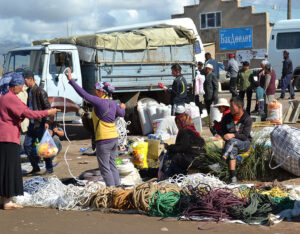The EU’s Rule of Law Initiative for Central Asia: From Initiative to More Substance?

Introduction
Since its launch in June 2007, the EU-Central Asia Strategy has been reviewed twice in Joint Progress Reports published by the Council and the European Commission. The latest review (June 2010) concludes that more work is needed on the ‘definition of [the EU’s] interests and priorities, the visibility of EU activities, and the coordination within the EU as well as with other actors’. (1) One year later, prior to the launch of the EU-Central Asia Rule of Law Platform project, this conclusion deserves special attention as regards the European Rule of Law Initiative (RLI), one of the most prominent and crucial elements of the Strategy’s regional dimension.(2)
EU support for legal reform initiatives in Central Asian states did not begin with the 2007 Strategy and its RLI. Since their independence, the Central Asian states have benefited from various technical assistance programmes from the Commission and EU Member States. The 2007 Strategy presents itself as the political superstructure to the Commission’s development strategy.(3) Security, stability and economic relations are highlighted as the EU’s key interests in Central Asia. Rule of law is seen as an essential condition, but its development is challenged by a number of risk factors. In Central Asia political instability is clearly linked to unequal wealth distribution and corruption, which leads to increased social tensions, migration and high crime rates. Instability is also caused by the ethnic, political and economic fragmentation of the Central Asian region and the unequal distribution of resources such as gas, oil and water. At the same time, economic interdependency, a Soviet heritage, remains high among Central Asian states. Afghanistan also poses a threat due to the spill-over of extremist Islamic activities and organised crime specialising in trans-border trafficking of human beings, weapons and drugs. Indeed, tensions arising as a result of these threats should be addressed at a regional level. However, such an approach is often hampered by the largely monopolised political structures and resulting restricted access to resources and economic power.(4)
It is hardly surprising that the RLI is presented as a key element of the 2007 Strategy. Central Asian governments are less interested in democratisation programmes, but they are interested in reforming the rule of law, where Europe is seen as a natural partner. The EU wants to meet this Central Asian demand as it believes that long-term stability can only be achieved on the basis of good governance, the rule of law, respect for human rights and democratic values and a market economy.(5) Central Asian governments and the EU can work together on this as both see functioning legal systems, including a strengthened commitment to international law, as crucial to socio-economic development as well as for the region’s trade and investment links with the outside world. They are also essential for better regional cooperation, which the RLI tries to anticipate through regional activities addressing common challenges on the basis of a common legal heritage.
Therefore, an innovative aspect of the RLI’s approach is not only the attempt to set up ‘a coordination mechanism among EU institutions and Member States to further support the modernisation of the legal sector, as part of a more comprehensive strategy.’(6) It also aims at ‘a concerted regional approach, taking into account national situations’.(7) In terms of content and approach the RLI therefore deserves pride of place within EU-Central Asia Strategy reviews.
This policy brief, first evaluates the relevance of the 2010 review for the RLI by assessing the definition of interests and priorities, coordination and visibility within the RLI’s framework. Secondly, it introduces the Rule of Law Platform project (RLP) as an instrument to meet the RLI’s current shortcomings. Following the assessment of the RLP’s potential and risks, the paper concludes with recommendations on how to assure the efficiency of the RLP in strengthening the RLI.
The Rule of Law Initiative: Priorities, coordination and visibility
The concept paper on the RLI states that the first joint meeting of justice ministers from EU Member States and Central Asian countries, which launched the Initiative in Brussels in November 2008, should identify the priority themes for a Rule of Law Platform. Here, the Ministers expressed the desire to continue cooperation ‘in all fields of law […] in the framework of the concept paper on the RLI’(8), which would include criminal, administrative, substantive private, procedural private and police law. However, at the same time the 2008 Ministerial Conference decided that constitutional and administrative law were priorities, as well as training, for all legal and judicial professions. The Ministers also noted their ‘interest’ in further cooperation in the sphere of criminal law, especially on issues of criminal procedure. The second Ministerial Conference took place in Dushanbe in June 2010. Besides legal training, the final communiqué now explicitly referred to criminal law as a priority area. Furthermore, it reaffirmed the desire to continue cooperation ‘in all fields of law’ and recommended for further discussion‚ new targeted actions in additional areas of cooperation of legal reforms and judiciary systems such as access to law […] commercial jurisdiction and law, and transposition of international norms and their effective application in the national context’.(9)
The communiqués of both Ministerial Conferences show a tendency to prioritise legal training and criminal law but lack an overarching orientation. Instead, they point to a variety of law fields as potential priority areas. Some relate to specific priorities identified in bilateral negotiations with each Central Asian country in the EU’s Development Cooperation Instrument’s (DCI) Indicative Programme (2011-2013).(10) Others relate to ongoing programmes of specialised agencies, e.g., commercial jurisdiction and law from the Deutsche Gesellschaft für Internationale Zusammenarbeit (GIZ), or constitutional and administrational law from the Venice Commission of the Council of Europe. This makes RLI priorities appear ad-hoc. Instead of outlining a well-defined long-term common European strategy RLI priorities respond to the diverse capacities, interests and strategies of individual organisations or development instruments and to the demands of Central Asian governments. At present it seems that the RLI is little more than an umbrella term for previously existing initiatives relating to the rule of law in Central Asia funded under different headings and priorities.
Regarding coordination, the RLI framework has led to improved collaboration among a core group of European actors. But, this group appears exclusive and its activities opaque for other actors. The latest planning meeting to follow up on the Ministerial Conference of June 2010 took place in February 2011 in Brussels. The list of participants, which was seen by the author, gives a realistic picture of who is (not) involved in coordinating actions within the RLI: the European External Action Service (EEAS), Finland, France, Germany, and the Venice Commission participated in the meeting.(11) At present, they are the EU’s key actors interested and engaged in coordinating the RLI.
When the RLI was launched, Germany and France, in close cooperation with the Commission, agreed to lead the coordination of EU activities as focal countries. Following the first Ministerial Conference in 2008, France supported the organisation of a first regional seminar on ‘Penal procedures and respect for rights of the defence’ in Tashkent, which was followed by a regional seminar organised with the support of Germany on ‘Legal Training in the 21st Century’ in Bishkek. Subsequent to the 2010 Ministerial Conference, both countries are planning a second set of regional seminars, most likely continuing the same subject areas, prior to the next Ministerial Conference in 2012.(12) In addition, Finland is planning to support a regional seminar on ‘Access to Justice’. Finland, who only recently joined the coordination group, will significantly increase the volume of development cooperation in the region by 2013.(13)
One of the EU’s cooperation partners within the RLI framework is the Venice Commission, which is implementing two RLI projects.(14) Although Central Asian countries want technical assistance from the Venice Commission, it is unclear if the work will continue to be funded after 2011, as co-financing has to be found. Furthermore, the EEAS and the Council of Europe are trying to widen their cooperation considerably by including other areas of the EU-Central Asia Strategy.(15) Though working on the Initiative’s priority fields, the OSCE Office for Democratic Institutions and Human Rights (ODIHR, Warsaw) is excluded de facto from RLI coordination meetings. This is unfortunate as all Central Asian states are OSCE members and host OSCE field missions with established contacts in local governments.(16) EU Member States like the United Kingdom or the Netherlands, which have been active in this sector in Central Asia are not part of the group. Specialised civil society organisations and donors with outreach to civil society and government structures in Central Asia are also absent.
The Initiative’s shortcomings in coordination are linked to its lack of visibility and transparency. The one number to call – a clear entry point to the EU’s RLI – is still missing. Documents required to understand the concept of the RLI are not available on EU websites, even though public documents like the EU-Central Asia Strategy reviews refer to them. Access to basic documents such as the RLI concept note is restricted to a small group of insiders. By June 2011, the in principle public communiqué of the 2010 Ministerial Conference in Dushanbe is still not available on the web. The conference itself, attended by only one of the five Central Asian ministers of justice is not even mentioned on the EU Delegation to Tajikistan website. More detailed conference reports and discussions of the Initiative’s future prospects are not public.
Public statements like the following suggest that too much transparency is unwelcome: ‘Progress, experience and priorities at regional – and country – level will be assessed through dialogue with the authorities concerned, as well as with EU member states and other relevant donors’.(17) Instead of allowing the Initiative to gain momentum by making it more visible, transparent and accessible to a broader public, it remains largely closed, bound by the EU respecting the sensitivities of the Central Asian states’ authoritarian leaders. The EU’s political leverage, however, is limited in this region. Russia and China are better placed to exercise their regional influence quickly and effectively, based on the similarities of their political regimes which are less constrained, for example, by internal mechanisms of democratic control. In this geopolitical context, the EU relies on the socialising effects of rather discreet negotiations and cooperative diplomacy.(18) EU ‘socialisation’, however, has previously proven successful thanks to broader people to people contacts and legal and normative approximations where commitments are made public and visible.
Thus, progress of the RLI since its launch in 2008 is still limited. The June 2010 review’s assessment that a precise definition of interests and priorities, improved coordination and higher visibility are needed, remains as valid as it did then. The launch of the RLP support project is expected to bring significant improvements by outsourcing the implementation of further Rule of Law Platform activities as a ‘project’ to a ‘high quality contractor’.(19)
The Rule of Law Platform
As recently as April 2011, the Commission announced a tender for the RLP support project with a May 2011 deadline. Aside from specific long-term projects,(20) the RLP itself is the second of the two kinds of actions which constitute the RLI. The RLP is expected to respond to the need for stepping-up dialogue and cooperation on rule of law issues. It is to take over the organisation of actions or events envisaged in the implementation of the RLI. Activities include: forums for dialogue, such as ministerial conferences, workshops and seminars; training and development of expert programmes, including the establishment of a regional network of trainers and training institutions and expert missions to Central Asia; communication and networking including the mapping of rule of law programmes and facilitating the sharing of experience among rule of law experts, such as, through the establishment of a website in all local languages; an advice facility to carry out studies at regional and/or national level, policy advice, analysis/assessment support, and/or background documents necessary to complement the meetings and/or training financed from this project. For all this, a total of 2 million euros is allocated under the DCI for 3 years, starting in October 2011.(21)
The RLP has the potential to address current shortcomings in the previously mentioned setting of priorities, coordination and visibility. Above all, coordination of the RLI is expected to improve considerably with the launch of the RLP support project. According to the RLP concept note, a Steering Committee will ensure regular meetings between the EEAS and Commission, coordinators of the Initiative, interested EU Member States, and the five Central Asian countries. Furthermore, it will develop three year and annual work plans,(22) which can be instrumental in specifying the guiding priorities of the RLI, with the support of the advice facility. New communication tools can address shortfalls in the RLI’s visibility.
At the same time, this ambitious platform project carries serious constraints and risks. Considering the tight budget of approximately 130,000 euros per country per year, the total amount and the impact of RLP activities might not meet expectations. The ensuing disappointment could risk jeopardising the positive effects of RLI’s increased visibility. Moreover, financial dependency could lead to further fragmentation and the RLP being hijacked by co-financing actors, with their own national or institutional agendas, particularly since the RLI does not have a consolidated common strategy for the region. Finally, a contractor for three years without substantial presence in Central Asia and unfamiliar with the RLI network, including its regional actors, could cause further disintegration and downgrade ownership on the Central Asian side.(23)
Recommendations
Given the tension between the range of expected RLP activities and its limited resources, the RLP’s steering actors should focus on actions which can strengthen the chances of the RLI becoming a dynamic and integrating key element of a common EU-Central Asia strategy. To this end:
- The Rule of Law Platform should further profile the RLI as the political superstructure for EU engagement in this field with Central Asian states, including for activities that take place on a bilateral basis. The RLI could then offer political guidance. To achieve this, the link and consistency between priorities defined at the RLP forums for political dialogue on the one hand and the bilateral funding under EU’s Indicative Programmes on the other should become more visible and evident.
- Focus on a single rule of law strategy would enhance ownership of the RLI by all actors, including Central Asian republics, as well as increase its overall impact by improved linking and integration of fragmented actions. Likewise, the RLP should consider creating success stories around a limited set of priorities which clearly mark the impact and public benefit of EU actions for the wider Central Asian public.
- The RLI coordinators, including the RLP contractor, should provide an easy entry point for interested actors who want to coordinate their activities within the RLI. At the same time, participation of all relevant actors in RLI coordination should be promoted more actively, without giving up on the idea of focal countries leading the overall coordination. Links to similar initiatives and their key actors in the European neighbourhood should be explored.
- RLP work programmes should be published on a RLI website, together with all other relevant documents. More visibility and transparency will not only address the present lack of accountability and scrutiny, but will also ensure broader involvement of civil society in Europe and Central Asia.
- The RLP should strive to further deepen the involvement of parliamentarians and civil society actors specialised in EUCentral Asia relations and in issues related to the rule of law, where appropriate. In particular, this would strengthen their ability to monitor reform, evaluate the impact of EU rule of law programmes and hold the EU and Central Asian governments to account. To achieve more ownership on their side, rule of law experts from parliaments and civil society could be invited to observe RLP Steering Committee activities. Furthermore, they could be consulted on RLP work programmes. A mechanism to support independent civil society activities could draw on experiences with the Civil Society Facility, as it is planned for the European Neighbourhood and as it operates in EU pre-accession countries.
Conclusion
The RLP has the potential to be more than an ill-resourced additional fragment of the EU’s engagement with Central Asia. In the Commission’s own words, it will become a strong and efficient coordination mechanism to ensure proper links between policy dialogue and project implementation, as well as ownership by the various stakeholders.(24)
In a region where the living conditions can force societies to challenge their political regimes in search of a better political order, the EU should stand for a credible alternative by furthering values such as the rule of law through the RLI and by offering a convincing example of how improved regional cooperation can work. In the long run, the RLI should be up-graded to become a centre of gravity, a guiding principle for any strategy designed by the EEAS and the Commission, EU Member States or other donors to assist rule of law development in Central Asian states.
The RLP project will need more substantial means in order to develop its full potential as a platform for political dialogue and as a central stimulus for accelerated reforms through better knowledge transfer in Central Asia. Only this way will it dispel the image of weakness created by half-hearted symbolic actions. Maybe then, what makes the RLI a key element of the EU’s Strategy for Central Asia will become more evident: A coherent strategy, flanked by visible and effective coordination of the EU’s already substantial bilateral engagement in Central Asia in the rule of law field.
- European Commission External Relations, Joint Progress Report by the Council and the European Commission to the European Council on the implementation of the EU Central Asia Strategy, Brussels 14 June 2010, p. 24.
- For a first critical review of EU’s RLI see Rico Isaacs, The EU’s Rule of Law Initiative in Central Asia, EUCAM, Policy Brief No. 9, Brussels/Madrid August 2009.
- Council of the European Union, European Union and Central Asia: Strategy for a New Partnership, Brussels October 2007 (EU-Central Asia Strategy), p. 6.
- Cf. Andrea Schmitz, Interessen, Instrumente, Einflussgrenzen. Die Europäische Union und Zentralasien, Bonn 2007 (Schmitz), p. 329-330.
- Cf. EU-Central Asia Strategy, p. 9, op. cit.
- European Commission External Relations, Concept Paper, EU Rule of Law Initiative for Central Asia, presented at EU-Central Asia ministerial Troika in Ashgabat, Brussels 9-10 April 2008 (Concept RLI).
- European Commission External Relations, Concept Note, EU-Central Asia Rule of Law Platform, unofficial version, Brussels 2008 (Concept RLP).
- Joint Communiqué, 2nd Conference of Ministers of Justice of the EU and Central Asia, Dushanbe 14-15 June 2010.
- Joint Communiqué, Launch of the EU’s Rule of Law Initiative for Central Asia, Brussels 27-28 November 2008.
- The EU Central Asia DCI Indicative Programme 2011-2013 identifies three priority areas for assistance to Central Asia: 1. ‘Promotion of regional cooperation and good neighbourly relations’; 2. ‘Poverty reduction and increasing living standards’; 3. ‘Good governance and economic reform’. In the framework of the first – regional – priority area, three focal sectors have been identified, one of them dedicated to ‘Rule of law, border management, customs, and the fight against organised crime’, funded with 10 million Euros, 2 million of which are allocated to the RLI/Rule of Law Platform project. In the framework of the second and third – bilateral – priority areas, again three focal sectors have been identified for each country in consultation with national governments. In three out of five Central Asian countries, one focal sector relates to the RLI sphere: 10 million Euros for judicial reform in Kazakhstan, 14 million Euros for judicial law and rule of law in Kyrgyzstan, 15 million Euros for rule of law, judicial reform and support to local government bodies in Uzbekistan (Cf. European Commission External Relations, Central Asia DCI Indicative Programme (2011-2013), Brussels April 2010 [DCI], p. 14-16).
- French and German public operators (ACOJURIS – Agence de Cooperation Juridique International, GIZ, and IRZ – Deutsche Stiftung für Internationale Rechtliche Zusammenarbeit) and Justice Ministries are also working in close cooperation. They are working with other European Member States and operators as well.
- Other than in 2009, no financial support for these regional seminars will be provided by the Commission in 2011. France, therefore, prefers to postpone the organisation of the next regional seminar to have it financed in the framework of the Rule of Law Platform project in 2012. Germany, on the other hand, plans the seminar for autumn 2011, depending on the available capacities of the organising Ministries and public operators.
- Ministry for Foreign Affairs of Finland, Guidelines for Finland’s Policy on Eastern Europe, the South Caucasus and Central Asia, Helsinki 2010, p. 21.
- The first, comprehensive project, runs for 2 years until December 2011 and covers all five Central Asian states. It includes objectives such as further development of constitutional mechanisms aimed at strengthening the principles of rule of law, enhancing the efficiency and independence of the judiciary, reform of the institution of public prosecution, further integration of international law into national legal systems, the reform of electoral systems and training of public administration officials, judges and lawyers. The second project aims specifically at assisting the authorities in reforming the legislation of Kyrgyzstan in line with international standards following the constitutional referendum of 27 June 2010.
- On 11 May 2011, the Committee of Ministers of the Council of Europe took the remarkable decision to extend possible cooperation with non-member countries in Europe’s neighbourhood, including all five Central Asian states. This cooperation could cover fields as wide as assistance to prepare the access of Central Asian states to open Council of Europe conventions, the fight against corruption, money laundering, drug abuse, election observation, etc., and would be funded by the EU.
- An example for the need to improve coordination between the EU and OSCE/ODIHR in the rule of law field is the fact that the 2010 Ministerial Conference on the RLI was immediately followed by the OSCE/ODIHR Criminal Justice Forum for Central Asia, which was organised by OSCE/ODIHR two days later in the same hotel in Dushanbe. Even though both events brought together hundreds of high level policymakers, academics and professionals to chart directions for legal reform in Central Asia, they were not linked with each other.
- DCI, p. 12, op. cit.
- Cf. Schmitz, p. 334.
- Concept RLP, op. cit.
- Specific long-term projects include programmes provided by Member States or the Commission as well as twinning and other programmes between European and Central Asian institutions. Cf. Concept RLP, op. cit.
- Cf. Concept RLP, op. cit. and EuropeAid/130949/C/SER/RSC.
- Cf. Concept RLP, op. cit.
- On 30 March 2011, a shortlist of potential contractors was published on the EuropeAid website under the reference: EuropeAid/130949/C/SER/Multi.
- Cf. DCI, p. 10, op. cit.



![shutterstock_1240181551 [Omgezet]](https://eucentralasia.eu/wp-content/uploads/2024/10/shutterstock_1240181551-Omgezet-300x248.jpg)



